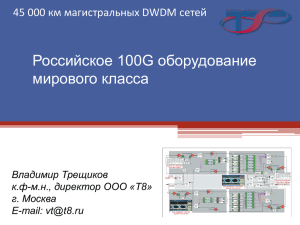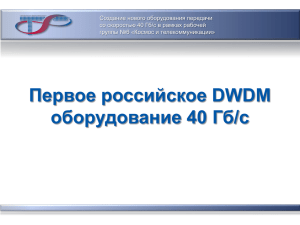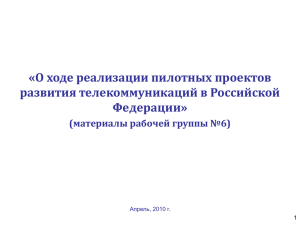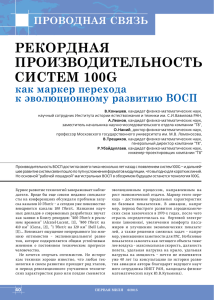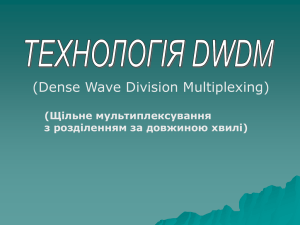ОСОБЕННОСТИ РАЗРАБОТКИ DWDM
реклама
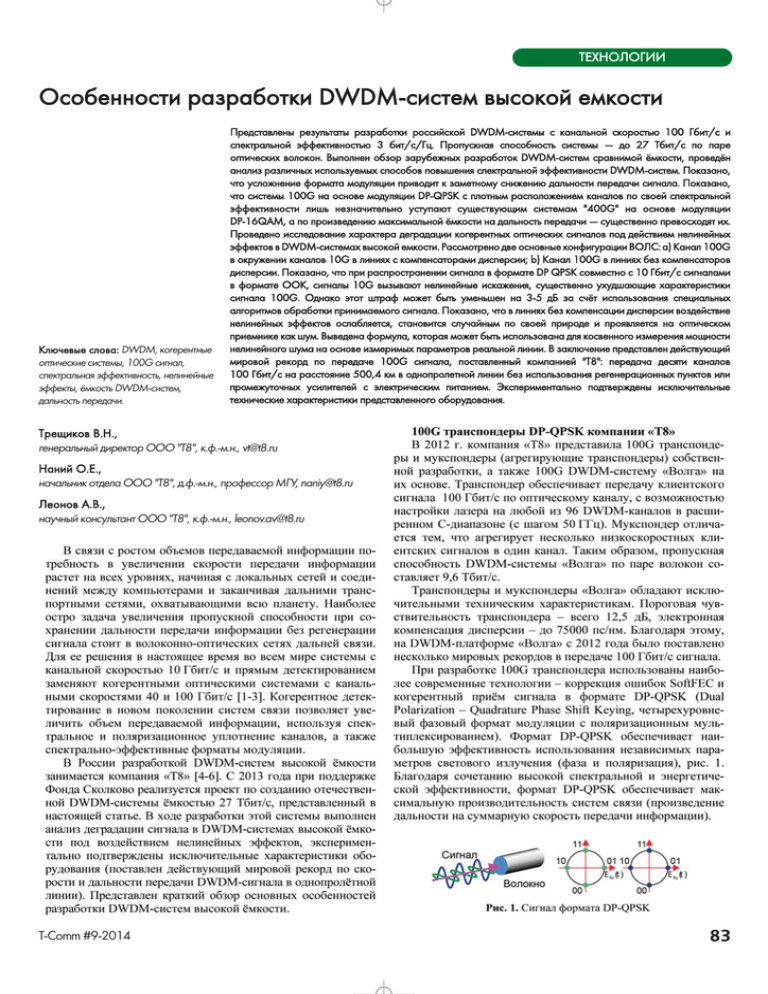
ТЕХНОЛОГИИ Особенности разработки DWDMсистем высокой емкости Ключевые слова: DWDM, когерентные оптические системы, 100G сигнал, спектральная эффективность, нелинейные эффекты, ёмкость DWDM*систем, дальность передачи. Представлены результаты разработки российской DWDMсистемы с канальной скоростью 100 Гбит/с и спектральной эффективностью 3 бит/с/Гц. Пропускная способность системы — до 27 Тбит/с по паре оптических волокон. Выполнен обзор зарубежных разработок DWDMсистем сравнимой ёмкости, проведён анализ различных используемых способов повышения спектральной эффективности DWDMсистем. Показано, что усложнение формата модуляции приводит к заметному снижению дальности передачи сигнала. Показано, что системы 100G на основе модуляции DPQPSK с плотным расположением каналов по своей спектральной эффективности лишь незначительно уступают существующим системам "400G" на основе модуляции DP16QAM, а по произведению максимальной ёмкости на дальность передачи — существенно превосходят их. Проведено исследование характера деградации когерентных оптических сигналов под действием нелинейных эффектов в DWDMсистемах высокой емкости. Рассмотрено две основные конфигурации ВОЛС: a) Канал 100G в окружении каналов 10G в линиях с компенсаторами дисперсии; b) Канал 100G в линиях без компенсаторов дисперсии. Показано, что при распространении сигнала в формате DP QPSK совместно с 10 Гбит/с сигналами в формате OOK, сигналы 10G вызывают нелинейные искажения, существенно ухудшающие характеристики сигнала 100G. Однако этот штраф может быть уменьшен на 35 дБ за счёт использования специальных алгоритмов обработки принимаемого сигнала. Показано, что в линиях без компенсации дисперсии воздействие нелинейных эффектов ослабляется, становится случайным по своей природе и проявляется на оптическом приемнике как шум. Выведена формула, которая может быть использована для косвенного измерения мощности нелинейного шума на основе измеримых параметров реальной линии. В заключение представлен действующий мировой рекорд по передаче 100G сигнала, поставленный компанией "Т8": передача десяти каналов 100 Гбит/с на расстояние 500,4 км в однопролетной линии без использования регенерационных пунктов или промежуточных усилителей с электрическим питанием. Экспериментально подтверждены исключительные технические характеристики представленного оборудования. Трещиков В.Н., генеральный директор ООО "Т8", к.ф.*м.н., [email protected] Наний О.Е., начальник отдела ООО "Т8", д.ф.*м.н., профессор МГУ, [email protected] Леонов А.В., научный консультант ООО "Т8", к.ф.*м.н., [email protected] TComm #92014 83 ТЕХНОЛОГИИ 84 TComm #92014 ТЕХНОЛОГИИ TComm #92014 85 ТЕХНОЛОГИИ 86 TComm #92014 ТЕХНОЛОГИИ TComm #92014 87 ТЕХНОЛОГИИ Aspects of development of high capacity DWDM systems Treshchikov V.N., general director, LLC "T8", candidate of physical and mathe*matical sciences, [email protected]; Naniy O.E., head of department, LLC "T8", doctor of physical and mathematical sciences, professor of the Moscow State University, [email protected]; Leonov A.V., scientific consultant, LLC "T8", candidate of physical and mathe*matical sciences, [email protected] Abstract. The article presents results of development of Russian DWDM system with a channel rate of 100 Gbit/s and a spectral efficiency of 3 bit/s/Hz. System capacity is up to 27 Tbit/s on a pair of optical fibers. The review of foreign DWDM systems of comparable capacity is performed, and the analysis of various ways of improving spectral efficiency of DWDM systems is conducted. It is shown that the increase of complexity of the modulation format leads to significant decrease of the signal transmission range. It is shown that the spectral efficiency of 100G systems based on the DPQPSK modulation with a dense arrangement of channels are only insignificantly inferior to existing "400G" systems based on DP16QAM modulation, while the product of maximum capacity by transmis sion range for such 100G systems significantly excels the same parameter of existing "400G" systems. A study of the degradation of coherent optical signal under the action of nonlinear effects in high capacity DWDM systems is performed. Two basic configurations of fiber optic lines are considered: a) 100G channel surrounded with 10G channels in lines with dispersion compensators; b) 100G channel in lines without dispersion compensators. It is shown that in case of propagation of the signal in the DP QPSK format together with 10 Gbit/s signal in OOK format, the last ones cause nonlin ear distortion which significantly degrade 100G signal. However, this penalty may be reduced by 35 dB by using special algorithms for processing the received signal. It is shown that in the lines with out dispersion compensators, the effect of nonlinear effects is reduced, becomes random and is manifested in the optical receiver as noise. A formula is derived which can be used to indirectly measure the nonlinear noise power based on measurable parameters of the real line. In conclusion, we present the current world record for transmission of 100G signal set by LLC "T8": the transmission of ten 100 Gbit/s channels over a distance of 500.4 km in a singlespan fiber optic line without the use of regenerative points or intermediate amplifiers with electrical power. Thus, the exclusive specifications of presented equipment are experimentally confirmed. Keywords: DWDM, coherent optical systems, 100G signal, spectral efficiency, nonlinear effects, capacity of DWDM systems, distance of transmission. References 1. S. Gringeri, N. Bitar, and T. J. Xia. Extending software defined network principles to include optical transport / IEEE Communications Magazine, March 2013, pp. 3240. 2. Gainov V.V., Gurkin N.V., Lukinih S.N., Akopov S.G., Makovejs S., Ten S.Y., Nanii O.E., Treshchikov V.N. Record 500 km unrepeatered 100 Gb s1 transmission / Laser Physics Letters, Vol. 10 (2013), No7, 075107. 3. Gurkin N.V., Nanii O.E., Novikov A.G., Plaksin S.O., Treshchikov V.N., Ubaydullaev R.R. Nonlinear interference noise in 100Gbit s1 communication lines with the DPQPSK modulation format / Quantum Electronics, Vol. 43 (2013), No6, pp. 550553. 4. Gurkin N.V., Treshchikov V.N., Novikov A.G., Nanii O.E. The Russian DWDM equipment with channel speed of 100 Gbit/c / TComm, 2012, No4, P. 6567. 5. Gurkin N.V., Nanii O.E., Treshchikov V.N. Capacity of coherent DWDM systems with channel speed of 100 Gbps / Vestnik Svyazi, 2013, No1, P. 3940; No2, P. 4042. 6. Nanii O.E., Treshchikov V.N., Ubaydullaev R.R. Operating range and bandwidth of coherent communication systems / Vestnik Svyazi. 2013. No9, P. 1719. 7. Annachiara Pagano, Emilio Riccardi, Marco Bertolini, Vitaliano Farelli, Tony Van De Velde. 400Gb/s Realtime Trial Using Rateadaptive Transponders for Next Generation Flexiblegrid Networks / OFC 2014, Tu2B.4.pdf. 8. Yu Rong Zhou, Kevin Smith , Roger Payne , Andrew Lord, Glenn Whalley, Tex Bennett, Eric Maniloff, Savchen*ko Alexander, and David Boymel. RealTime Gridless 800G Superchannel Transport Field Trial over 410km Us ing Coherent DP16 QAM / OFC 2014, Tu2B.3.pdf. 9. Liangchuan Li, Yanzhao Lu, Ling Liu, Deyuan Chang, Zhiyu Xiao, Yijia Wei. 20x224Gbps (56Gbaud) PDMQPSK Transmission in 50GHz grid over 3040km G.652 fiber and EDFA only link Using Soft Output Faster than Nyquist Technology / OFC 2014, W3J.2.pdf. 10. Ming*Fang Huang, Shaoliang Zhang, Katsyuki Mino, and Yoshiaki Aono. Transmission of 400G DualCarrier DP16QAM and MultiCarrier DPQPSK Signals over Regional and LongHaul Distances with Span Lengths Greater than 200 km / OFC 2014, Th4F.3.pdf. 11. Shaoliang Zhang, Fatih Yaman, and Ting Wang. Transoceanic Transmission of DualCarrier 400G DP8QAM at 121.2km Span Length with EDFAOnly / OFC 2014, W1A.3.pdf. 12. G. Raybon, A. Adamiecki, S. Randel, P. J. Winzer. SingleCarrier and DualCarrier 400Gb/s and 1.0Tb/s Transmission Systems / OFC 2014, Th4F.1.pdf. 13. A. Carena, V. Curri, G. Bosco, P. Poggiolini, F. Forghieri. Modeling of the Impact of NonLinear Propagation Effects in Uncompensated Optical Coherent Transmission Links / Journal of Lightwave Technology, Vol. 30, No10, pp. 15241539, 2012. 88 TComm #92014

